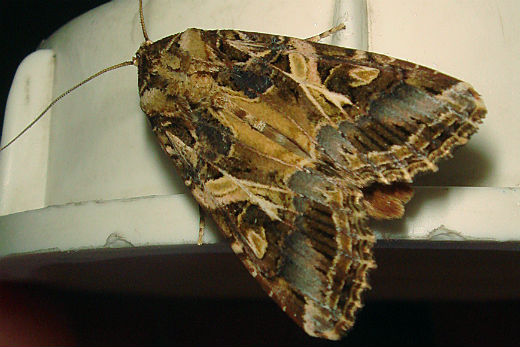Tauranga's long Indian summer may have extended the activity of a voracious agricultural and garden pest as Pyes Pa resident Geoff Chard discovered.
He discovered his taro plants at Pyes Pa stripped bare by a horde of voracious caterpillars.
Spodoptera Litura or the taro caterpillar moth.
'The damage it does is unbelievable. We put in these taro in the new place as one of the plants. They were getting stripped. I thought it was the wind initially,” says Geoff.
He found bugs he had never seen before and nobody else had seen them.
He sent a few off to the Ministry of Primary Industries, whose entomologist identified them at tropical army worm, whose caterpillars eat just about every known type of vegetable food crop.
'The eggs these things lay were just astronomical. I finally caught one of these moths the other day.
'I've sprayed these things, had a couple of goes. Thought I might have been on top of it. Only pure luck that I was able to find the thing and get some sense out of some people. Two or three people who were supposed to know something hadn't seen them before.”
Gardeners need to be aware of them so they don't let them get a hold, says Geoff.
'I've only got six or eight plants or something I would have easy killed 500 caterpillars and that would be conservative – and thousands of eggs.
'I just think it needs to be general knowledge. People need to know. Don't let this thing get established. As far as I can ascertain it's new here. So we don't want it getting a strong hold.
'Most people think they're a butterfly flying round, but these things are flying around at night time.”
Army worm caterpillars are on the march, and munching through newly sown pastures in the Bay of Plenty.
In April agricultural contractor Bill Webb warned farmers to check paddocks after discovering army worm on land returned to pasture after maize crops and lucerne stands. Bill sprayed more than 100ha to control the worms.
They are named army worm from the way the caterpillars ‘march' across a field, eating all suitable plant material in their path.
They are fast breeders. In summer eggs hatch within a week, and the caterpillars take about three-four weeks to fully develop. The pupal stage lasts about two weeks and the female moth begins laying eggs about four days after it emerges from the pupa.
Several generations occur during spring-autumn, with the number depending on the average temperature.



2 comments
nuisance
Posted on 08-06-2016 14:20 | By Blogger
We've had them 3 years now, (Welcome Bay). I have been picking them off for months, how do I get rid of them? Cant grow veges for my family! I have tried natures way spray, no good.
frustrating
Posted on 09-06-2016 13:32 | By katboo
Hi, we grow plants in a hothouse and we have had these little critters come and go for the last 6-7 years. No natural base spray will kill them,I found that a regular spray routine works and weeding around the area helps, the only plant they don't eat is wandering dew. Fingers crossed for a good hard frost to kill them above and below ground.
Leave a Comment
You must be logged in to make a comment.